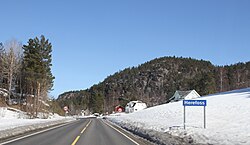Herefoss (municipality)
Herefoss herred | |
|---|---|
 View of the village of Herefoss | |
 Aust-Agder within Norway | |
 Herefoss within Aust-Agder | |
| Coordinates: 58°31′27″N 8°21′04″E / 58.5243°N 08.3511°ECoordinates: 58°31′27″N 8°21′04″E / 58.5243°N 08.3511°E | |
| Country | Norway |
| County | Aust-Agder |
| Established | 1 Jan 1838 |
| Disestablished | 1 Jan 1967 |
| Administrative centre | Herefoss |
| Area | |
| • Total | 148 km2 (57 sq mi) |
| *Area at municipal dissolution. | |
| Population (1967) | |
| • Total | 585 |
| • Density | 4.0/km2 (10/sq mi) |
| Time zone | UTC+01:00 (CET) |
| • Summer (DST) | UTC+02:00 (CEST) |
| ISO 3166 code | NO-0933 |
| Created as | Formannskapsdistrikt in 1838 |
| Succeeded by | Birkenes in 1967 |
Herefoss is a former municipality in the old Aust-Agder county in Norway. The municipality existed from 1838 until its dissolution in 1967 when it was merged into Birkenes municipality in what is now Agder county. Herefoss was a 148-square-kilometre (57 sq mi) area surrounding the Herefossfjorden (part of the river Tovdalselva). The administrative centre was the village of Herefoss where the Herefoss Church is located. The other main village was Søre Herefoss, located in the southern part of the municipality.[1]
History[]
The municipality of Heirefos was established on 1 January 1838 (see formannskapsdistrikt law). In 1900, 610 people lived in the municipality on 67 different farms. During the 1960s, there were many municipal mergers across Norway due to the work of the Schei Committee. On 1 January 1967, Herefoss (population: 585) was merged with the neighboring municipalities of Birkenes (population: 1,883) and Vegusdal (population: 582), forming the new municipality of Birkenes with its administrative centre located at Birkeland.[2]
Herefoss was historically the seat of public officials in this region. The fogd resided here from 1680 to 1820, and the sorenskriver (district judge) also lived here from 1724 to 1852. Herefoss was established as a prestegjeld in 1875. Herefoss Church was consecrated by Bishop Jacob von der Lippe in 1865.[citation needed]
Name[]
The first documented occurrence of the name Hegrafoss stems from 1487, and the Old Norse form of the name must then have been Hegrafors. The first element is the genitive case of the bird name hegri (grey heron) (same as the local river name, Hegra), and the last element is fors which means "waterfall". Later, it was spelled Heirefos and ultimately Herefoss.[3]
Government[]
All municipalities in Norway, including Herefoss, are responsible for primary education (through 10th grade), outpatient health services, senior citizen services, unemployment and other social services, zoning, economic development, and municipal roads. The municipality was governed by a municipal council of elected representatives, which in turn elected a mayor.[4]
Municipal council[]
The municipal council (Herredsstyre) of Herefoss was made up of 13 representatives that were elected to four year terms. The party breakdown of the final municipal council was as follows:
| Party Name (in Norwegian) | Number of representatives | |
|---|---|---|
| Labour Party (Arbeiderpartiet) | 6 | |
| Christian Democratic Party (Kristelig Folkeparti) | 2 | |
| Centre Party (Senterpartiet) | 4 | |
| Liberal Party (Venstre) | 1 | |
| Total number of members: | 13 | |
See also[]
References[]
- ^ Thorsnæs, Geir, ed. (29 January 2016). "Herefoss". Store norske leksikon (in Norwegian). Kunnskapsforlaget. Retrieved 8 June 2017.
- ^ Jukvam, Dag (1999). "Historisk oversikt over endringer i kommune- og fylkesinndelingen" (PDF) (in Norwegian). Statistisk sentralbyrå. Cite journal requires
|journal=(help) - ^ Rygh, Oluf (1905). Norske gaardnavne: Nedenes amt (in Norwegian) (8 ed.). Kristiania, Norge: W. C. Fabritius & sønners bogtrikkeri. p. 71.
- ^ Hansen, Tore, ed. (12 May 2016). "kommunestyre". Store norske leksikon (in Norwegian). Kunnskapsforlaget. Retrieved 21 December 2020.
- ^ "Kommunevalgene 1963" (PDF) (in Norwegian). Oslo: Statistisk sentralbyrå. 1964. Retrieved 21 December 2020.
- ^ "Kommunevalgene og Ordførervalgene 1959" (PDF) (in Norwegian). Oslo: Statistisk sentralbyrå. 1960. Retrieved 21 December 2020.
- ^ "Kommunevalgene og Ordførervalgene 1955" (PDF) (in Norwegian). Oslo: Statistisk sentralbyrå. 1957. Retrieved 21 December 2020.
- ^ "Kommunevalgene og Ordførervalgene 1951" (PDF) (in Norwegian). Oslo: Statistisk sentralbyrå. 1952. Retrieved 21 December 2020.
- ^ "Kommunevalgene og Ordførervalgene 1947" (PDF) (in Norwegian). Oslo: Statistisk sentralbyrå. 1948. Retrieved 21 December 2020.
- ^ "Kommunevalgene og Ordførervalgene 1945" (PDF) (in Norwegian). Oslo: Statistisk sentralbyrå. 1947. Retrieved 21 December 2020.
- ^ "Kommunevalgene og Ordførervalgene 1937" (PDF) (in Norwegian). Oslo: Statistisk sentralbyrå. 1938. Retrieved 21 December 2020.
- Birkenes
- Former municipalities of Norway
- 1838 establishments in Norway
- 1967 disestablishments in Norway


